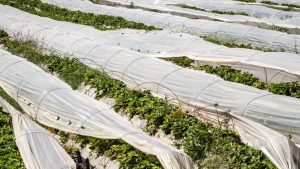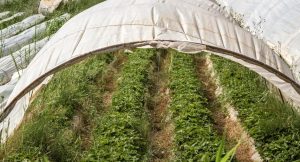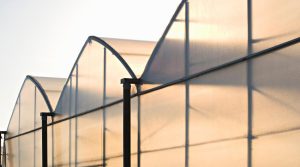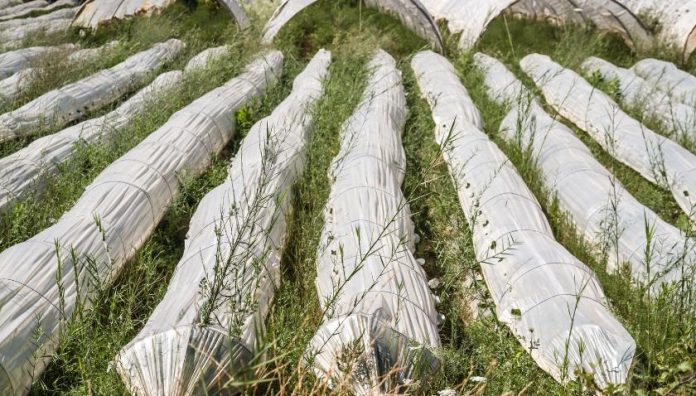Table of Contents
In today’s agriculture industry, horticultural polythene has become an indispensable tool for farmers around the world. Horticultural polythene refers to plastic sheets made from high-density polyethylene, specially designed for agricultural applications like mulching, greenhouse covers, and tunnels. The unique properties of horticultural polythene make it perfectly suited for creating optimal growing conditions for crops, ultimately boosting yields and profits.
The rise of horticultural polythene has transformed modern farming operations. Its versatility, durability, and cost-effectiveness provide numerous benefits that are difficult to achieve with traditional materials. Horticultural polythene allows farmers to manipulate and control their growing environments, protect crops, improve soil conditions, extend growing seasons, and increase productivity. With the global population expected to reach 10 billion by 2050, the role of horticultural polythene in sustainably intensifying food production will only continue to grow in importance.
Advantages of Using Horticultural Polythene
Horticultural polythene provides numerous benefits that give farmers an edge over traditional agricultural practices.
Some of the key advantages include:
Increased Crop Yields and Quality

The use of horticultural polythene can dramatically increase crop yields and improve product quality. Polythene mulch helps warm soil temperatures early in the season, allowing earlier planting and faster growth. The reflective surface repels insects while preventing weed growth. Polythene tunnel houses and greenhouse covers create optimal growing environments safe from hail, frost, wind damage, and excessive rain. With polythene, farmers can expect higher yields and larger, more uniform, and blemish-free crops.
Protection Against Pests and Harsh Weather
Horticultural polythene offers invaluable protection from pests, diseases, and weather extremes that can quickly devastate crops. Greenhouse poly covers create stable internal climates, while polytunnels protect plants from hail, frost, flooding, and droughts. Polythene mulch forms a physical barrier against soil-borne diseases and pests. Special photoselective and insect-repellent polythene films are also available. The protective benefits of horticultural polythene are difficult and expensive to replicate with traditional materials.
Water Conservation and Efficient Irrigation
Horticultural polythene enables major water savings compared to uncovered soil. Polythene mulch prevents evaporation, reducing water loss by up to 70%. Greenhouses allow better control over irrigation timing and amounts. Polythene pipes and drip tape enable highly efficient application of water and nutrients directly to crop root zones. In drought-prone areas, the water-saving benefits of horticultural polythene can make or break a crop’s success.
Cost Savings
Despite the higher upfront costs, horticultural polythene saves farmers money in the long run. The yield increases, premium quality produce and protection benefits quickly offset material costs. Polythene films last up to 2-3 seasons, eliminating yearly purchases of organic mulches. Efficient water use reduces irrigation expenses. Overall, horticultural polythene provides a rapid return on investment while boosting profitability.
Types of Horticultural Polythene
Horticultural polythene comes in several forms to suit the diverse needs of farmers. The main types include:
Polythene Mulch Films
Polythene mulch films are thin plastic sheets placed over the soil to modify the microclimate around plants.

Common mulch films include:
- Black polythene mulch – Blocks light to prevent weed growth and warm soil. Best for warm-weather crops.
- Clear or Transparent Mulch – Allows sunlight to pass through for weed control via solarization. Used to warm soil in cooler climates.
- Colored Mulch Films – Various colors create different effects. Red mulch boosts yields of fruits and flowers. Silver mulch deters aphids and whiteflies.
- Photodegradable Mulch – Breaks down over time in sunlight. Used for single-season mulching.
- Biodegradable Mulch – Made from plant-based plastics like PLA. Degrades harmlessly in the soil.
Polythene Tunnel Covers
Polythene sheets are used to cover tunnel houses and row covers. They regulate temperature, light, humidity and airflow while providing protection.
Common types:
- Low tunnels – Small hoop tunnels covered in polythene for cold protection.
- High tunnels – Tall narrow tunnels that boost growth and yields.
- Shade nets – Woven polythene nets that provide adjustable shade levels.
Greenhouse Polythene
Transparent greenhouse polythene optimizes light transmission while insulating the interior. Longer-term films feature UV blockers and IR absorbers for climate control.
Polythene Pipes and Tubes
Polythene pipes, drip tapes, and emitters enable efficient delivery of irrigation water and liquid nutrients to plant roots.
The wide selection of horticultural polythene allows growers to choose the right products to create optimal growing conditions for their crops. Let me know if you need any clarification or have additional types to cover.
Applications of Horticultural Polythene
Horticultural polythene has become indispensable in nearly every aspect of commercial farming. Some of its key applications include:
Mulching and Weed Control
Laying polythene mulch sheets is a popular non-chemical method to control weeds. The impermeable barrier blocks light and prevents weed seed germination and growth. Colored mulches provide added benefits like soil warming and pest control. Polythene mulch also reduces soil evaporation and erosion. It is more durable and cost-effective compared to organic mulches.
Greenhouse Construction and Maintenance

Polythene films are the primary covering material for greenhouses and polytunnels. Multi-layer polythene greenhouse panels provide insulation, light diffusion, and strength. Special IR thermal polythene improves greenhouse climate control. Polythene facilitates rapid greenhouse construction at lower costs compared to glass. It also enables easy replacement and maintenance of worn panels.
Drip Irrigation and Water Conservation
Polythene drip tapes and emitters enable highly efficient irrigation directly to the plant’s root zone. This avoids water losses from runoff or evaporation from bare soil. Polythene pipes are versatile for above-ground or buried drip systems. Compared to sprinklers, drip systems using polythene components conserve water, nutrients and labor.
Crop Protection and Pest Management
Horticultural polythene is a simple and chemical-free line of defense against pests and diseases. Mulch films act as a physical barrier to soil-borne pests and weed seeds. Polytunnels and greenhouse polythene protect crops from weather extremes that favor pathogens. Photoselective and insect-repellent polythene films help control pests without insecticides.
The versatility of horticultural polythene allows it to enhance nearly every aspect of commercial growing operations. Let me know if you would like me to expand on any particular application in more detail.
Conclusion
Horticultural polythene has proven itself as a transformative technology for modern agriculture. The unique properties of polyethylene films and tubes enable growers to optimize crop-growing environments, increase productivity, and improve product quality. While traditional materials carry disadvantages like high costs, inefficiency, and lack of durability, the advantages of horticultural polythene continue to expand as new engineered films are developed.
Today, horticultural polythene is an indispensable tool integrated into nearly every aspect of commercial farming. From mulch films and greenhouse covers to drip irrigation tubing, polythene improves soil conditions, water delivery, and climate control inside and outside protected structures. Polythene provides inexpensive protection from pests, diseases and damaging weather. It enables season extension, higher yields, and sustainable intensification even in difficult environments.
With the global population on the rise, the world needs agricultural technologies that enhance productivity while using resources efficiently. Horticultural polythene checks every box. While upfront costs are higher, polythene quickly pays for itself through increased yields, premium quality produce, and effective protection from threats. As food security and climate change concerns grow, horticultural polythene will only increase in importance for feeding the planet.


